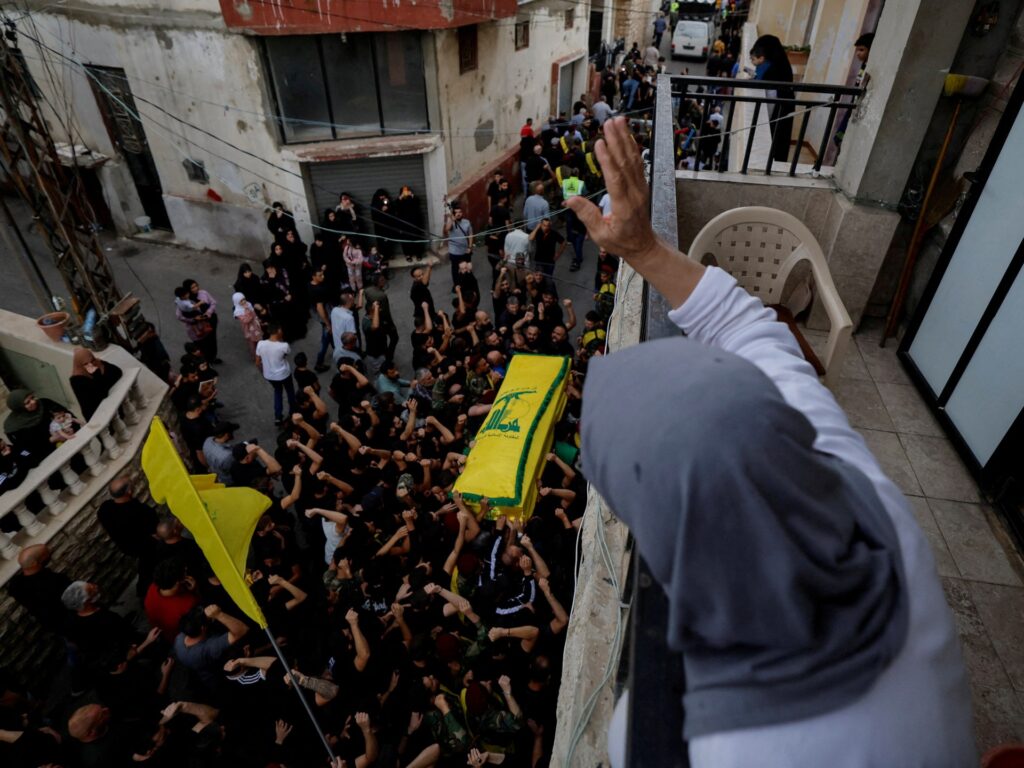In Lebanon, there are growing fears that fighting between the armed group Hezbollah and Israel is spiraling out of control, even as many residents sympathize with Palestinians bombed in Gaza during Israel’s war with Hamas.
In recent days, the Lebanese armed group and Israel have launched deeper attacks on each other, an escalation from previous skirmishes limited to the Israel-Lebanon border region.
The attacks mainly target military outposts and fighters, although some civilian casualties have been recorded.
Most Lebanese villages caught in the crossfire have been emptied of their inhabitants, many of them having fled to Hezbollah’s stronghold in the suburbs of the capital Beirut. This area remains safe at this time.
“I really hope that a total war does not start, because it will never stop,” Elie Khoury, 30, said from his phone store in Beirut. “We won’t be able to cope with it (economically). We don’t even have enough medicine and there is a shortage of syringes in hospitals.”
An online petition, which already has 8,939 signatures, calls on the Lebanese government not to be drawn into war. He warns that Lebanon could otherwise become another “battlefield for proxy wars” waged by foreign powers.
Some residents, however, told Al Jazeera that they would support Lebanon taking a more aggressive stance, citing the high death toll resulting from Israeli attacks on Gaza.
More than 8,000 Palestinians have been killed in ongoing Israeli bombardments, according to the Gaza Health Ministry. Of this figure, 3,195 were children. This is more than the total number of children killed each year in conflict zones across the world since 2019, according to the non-governmental organization Save the Children.
“Israelis are killing children. What is happening in Gaza is not a war. It’s a massacre,” said Jack Topalian, who runs a coffee stand in Beirut. “How can we keep silent?
“A stable model”
Hezbollah and Israel have so far avoided striking major urban centers in their respective territories and causing serious civilian casualties, both precautions required under international humanitarian law.
“Both evacuated their villages in order to limit the number of human deaths,” said Randa Slim, a Lebanese expert at the Middle East Institute.
Nevertheless, she noted that the increase in violence is worrying. Hezbollah claimed to have lost 50 fighters in the fighting, and Israel said six of its soldiers also died.
“We are seeing a steady escalation every few days. It’s a consistent trend,” Slim said. “The trend is telling…but so far it doesn’t seem out of control.”
Meanwhile, Palestinian fighters based in Lebanon have also intensified their attacks.
On October 29, the Palestinian group Hamas said its fighters had fired rockets from Lebanon, while another Palestinian armed group also claimed responsibility for launching explosives toward northern Israel.
The involvement of Palestinian fighters allows Hezbollah to claim plausible deniability if its forces cross Israeli “red lines,” such as killing civilians or attacking inhabited towns, Slim said.
But these attacks carried out by the Palestinians are the source of tensions in Lebanon. Groups like the Palestine Liberation Organization played a leading role in Lebanon’s 15-year civil war before being expelled in 1982. The presence of other Palestinian fighters remains controversial.
“It’s a calculated risk on (Hezbollah’s) part,” Slim said of the group’s cowardly collaboration with Palestinian fighters, “because for the majority of Lebanon it brings back bad memories.”

Political paralysis
Lebanon’s interim Prime Minister Najib Mikati told AFP on Monday he was working to avoid war despite the escalation on its southern border.
“(The) Lebanese have had enough of wars,” he said.
He added that Hezbollah – a force far more powerful than the Lebanese National Army – handled the situation “rationally and wisely”. But he expressed fear that Lebanon could descend into war, triggering a wider regional conflict.
“Chaos could engulf the entire Middle East,” he warned.
Walid Jumblatt, leader of Lebanon’s Druze minority, also said that “the fate of Lebanon is at stake” and that the country’s leaders are advising Hezbollah not to intensify its attacks.
However, neither leader has influence over Hezbollah, which is regionally supported by Iran.
Hassan Nasrallah, who is Hezbollah’s secretary general, is expected to deliver a speech Friday on the group’s struggle with Israel and the ongoing Israeli bombing of Gaza. His words could shape the fate of the country and the region.
“The Israelis are unable to advance into Lebanon by land. But we still need to be careful and monitor the situation until Nasrallah speaks,” said Qassem Kassir, a Lebanese commentator close to Hezbollah.
A Lebanese lawmaker, who spoke anonymously to Al Jazeera given the sensitivity of the situation, said it would be a disaster if Lebanon entered into a wider conflict with Israel given its acute economic crisis, lack of social cohesion and the absence of a president. .
Lebanon’s parliament has so far been unable to elect a successor to former President Michel Aoun, who left office a year ago.
The MP added that discussions in Parliament mainly revolve around mobilizing support for Palestinians in Gaza and emergency preparations in the event of all-out war.
“We should have a clear position to stop the war in Gaza, be (in support of) the Palestinian people and take a stand,” he told Al Jazeera. “But the situation in Lebanon is also dangerous… and we want de-escalation. »

